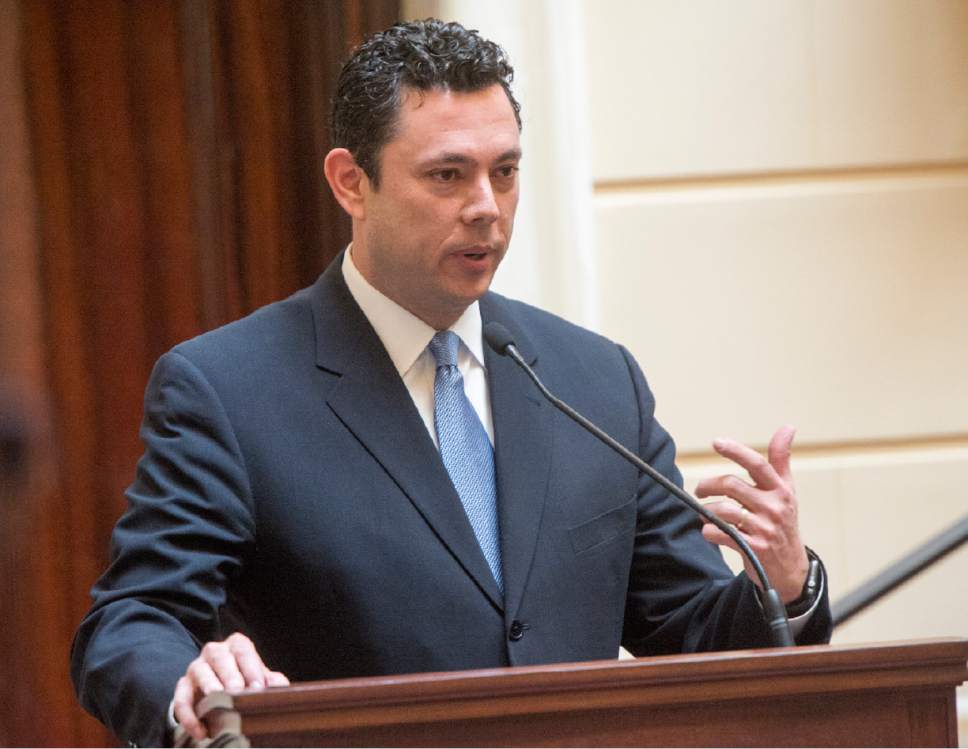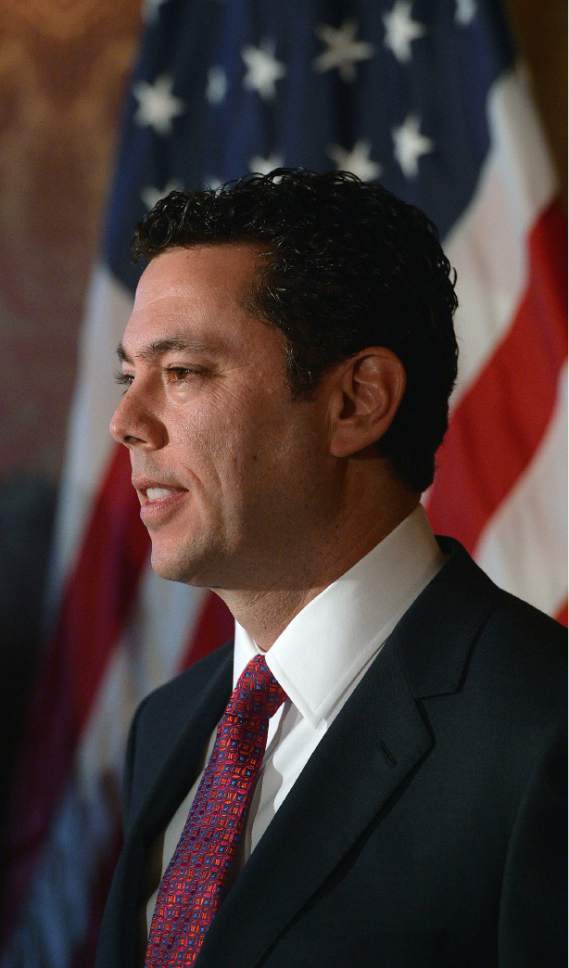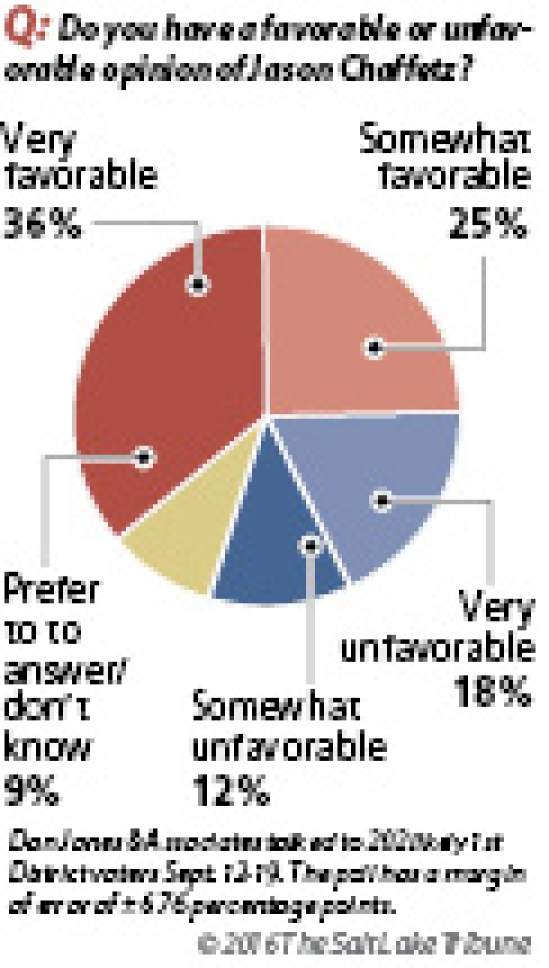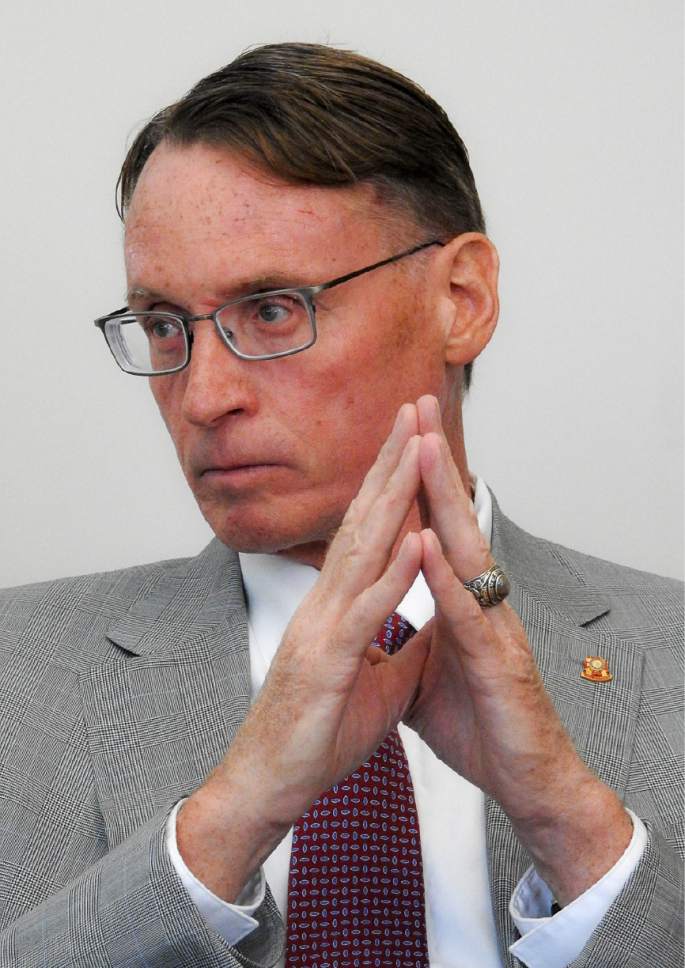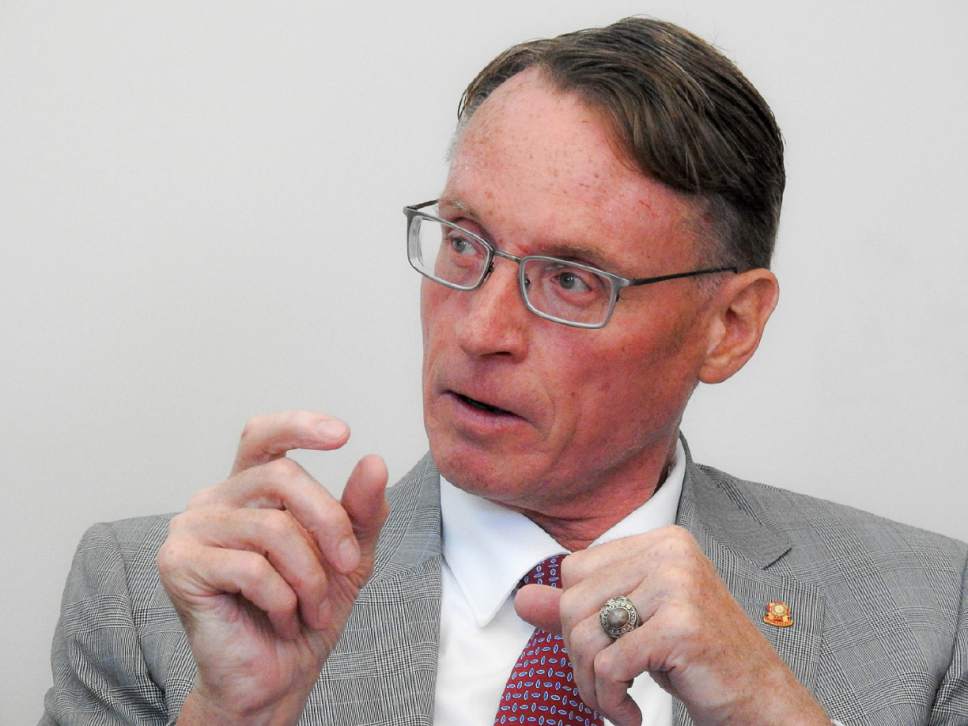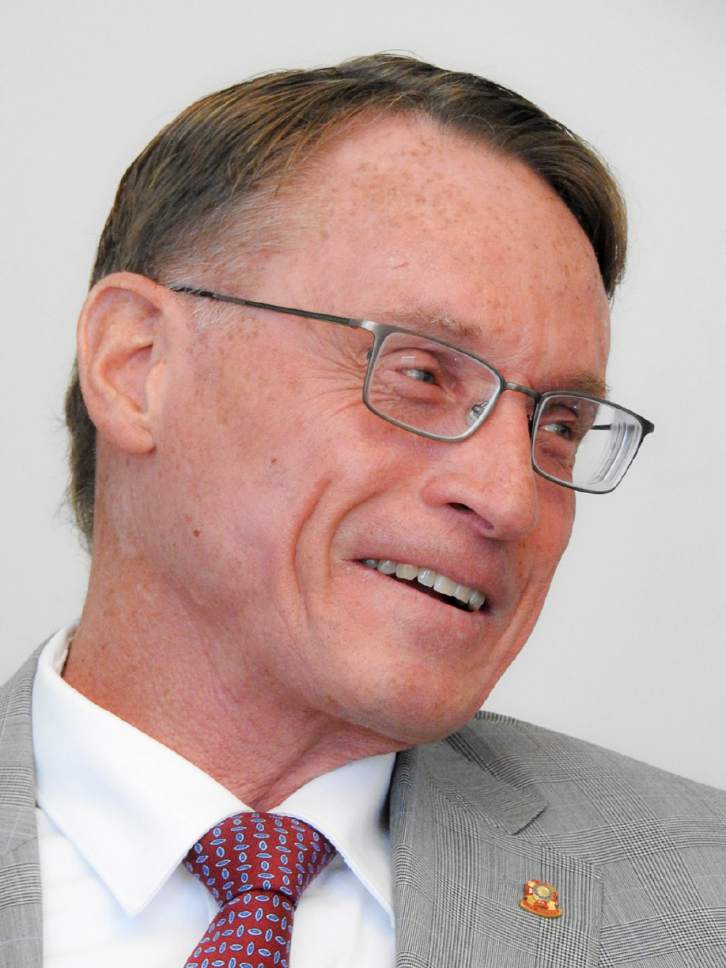This is an archived article that was published on sltrib.com in 2016, and information in the article may be outdated. It is provided only for personal research purposes and may not be reprinted.
Two years ago, Rep. Jason Chaffetz, R-Utah, won re-election with 72.3 percent of the 3rd Congressional District vote. Stephen Tryon received a minuscule 1.8 percent that year running as an unaffiliated candidate. This year, he is the Democratic nominee.
Chaffetz has been leading their race in polls by more than 45 percentage points as he attracts national headlines by using the chairmanship of his Oversight and Government Reform Committee to relentlessly attack Hillary Clinton. A recent Salt Lake Tribune-Hinckley Institute of Politics poll also shows that voters have a favorable opinion of Chaffetz by a margin of 61 percent to 30 percent.
And Chaffetz has outraised Tryon this cycle by 30 to 1.
Still, Tryon — an Overstock.com vice president, retired Army lieutenant colonel, West Point graduate and former ethics instructor — says Chaffetz is more interested in national publicity than local concerns and is pushing for a change.
"It's Jason Chaffetz's job to make the government work for the people of the 3rd District," Tryon says. "I don't think that's what he's doing."
He adds, "Imagine you bought something from Overstock.com, and the wrong thing was delivered. So you call customer service, and it says, 'You know the people in our warehouse aren't that smart and I think the boss is a crook' [instead of fixing it.]. You wouldn't be working for me long. But that's Jason's shtick on the government."
—
Improper focus? • Tryon believes one way to reduce the national debt would be to ferret out waste and abuse. That, he says, is what Chaffetz's Oversight Committee is supposed to be doing, instead of playing politics.
"One of my frustrations with Jason is he has been in the perfect position to address waste, fraud and abuse for the last several years and he hasn't done it. He's been focused on going after the Democratic nominee for president and undermining her."
Chaffetz says his hearings on Clinton's email and the attacks on Benghazi embassy are a small part of his committee's work, but have been spotlighted because she is the Democratic nominee.
"We've had a couple of hearings regarding the breaches at the State Department [under Clinton] out of hundreds. It's not as if we have solely focused on that. Hillary Clinton chose that path, not me," he says. "This is potentially one of the largest breaches of security in the history of the State Department. She had classified information out there that will get people killed. I didn't do that. She did. So it would be malpractice for me to ignore it."
He adds that he hasn't ignored waste and abuse, and recently held hearings, for example, on high prices for some drugs, such as the EpiPen.
—
Power • Chaffetz says he enjoys a position that gives power to Utah and his district, and cites that as a key reason he should be re-elected.
"There are only 18 chairmen in authorizing committees in the House of Representatives. So from there you can set the agenda. … You can actually have a real strong voice and fight for your fellow Utahns," he says. "That's a rare privilege, and I don't take it for granted. I'd like to keep fighting."
He adds, "Washington, D.C., is a mess, as much as it's ever been. And no matter who's elected the president, the Oversight Committee is the place to be, I tell you that." He vows to keep a close eye on either Clinton or Donald Trump.
Some other actions lead Tryon to question whether Chaffetz is more interested in the national spotlight and increasing his political power than in his district.
For example, Chaffetz made a short-lived bid for House speaker last year when Republican turmoil prompted Ohio's John Boehner to step down.
He is mentioned as a possible candidate for the U.S. Senate in two years, but Chaffetz discounts that. "Why would I want to leave a chairmanship in the House to be a rookie in the Senate? I'd like to be chairman for the next two terms, through 2020."
Meanwhile, Tryon says he conducted a "listening tour" in every corner of the district to learn voter concerns.
"I'm going to make the people feel like the government is representing them," he says.
If elected, he promises to use a computer system where constituents could weigh in on issues, and says he would usually vote the way a majority of voters desire as reflected in such outreach, except where he believes it is absolutely wrong, and then he would explain his stand.
If a majority wanted him to try to overturn restrictions on abortion, for example, he says he would explain that he doesn't feel the Constitution allows that. "It's not a question of whether I morally approve of abortion or not; it's a question of what the Constitution is supposed to guarantee every citizen. I would do my best to explain that."
—
Party switchers • Chaffetz was once a Democrat — and was even the state chairman for 1988 Democratic presidential nominee Michael Dukakis (whose wife was once married to Chaffetz's father). He says a later-developed admiration of Ronald Reagan led him to switch.
Tryon once was a Republican. "I really liked Ronald Reagan." But he says he spent most of his life as a Democrat. He ran as an independent last election because "rather than focus on party, for me, the focus was on the character of a leader."
The political paths Chaffetz and Tryon have traveled sometimes have intersected, but they clash on many issues.
—
Immigration • One area of big disagreement is how to handle undocumented immigrants.
Chaffetz says something a little surprising for a GOP leader: "I am embarrassed for my party and Congress that we didn't deal with this."
A first step is "we've got to fix legal immigration," he says, blaming long waits and small quotas for waves of illegal entry by those who lose hope of ever coming within the rules.
Chaffetz says he passed a bill in the House seeking to adjust the legal immigration spigot. "But the Senate did not take it up."
"I am opposed to amnesty," he says of plans to provide a path to citizenship, but adds he would not mind giving work permits to undocumented immigrants already here — once legal immigration is fixed.
Tryon, meanwhile, supports a pathway to citizenship. "I am a big fan of taking care of immigrants whose only crime is to try to get someplace better than where they were."
He likes the idea of allowing some to earn citizenship through service — noting that his Irish grandfather obtained U.S. citizenship by enlisting in the Army during World War I.
"When I was a company commander in the 82nd Airborne Division," Tryon says, "some of my best noncommissioned officers were here with green cards."
—
Gun laws • Tryon is a gun owner and says he doesn't see firearms regulation as the problem behind gun violence, and generally doesn't see a need for much tighter restrictions. But he supports some changes.
"We should be doing background checks on every gun purchase. I think people who are felons and people who have a history of mental illness should not be allowed to purchase guns. I like the idea of restricting magazine size."
Chaffetz opposes limiting magazine sizes as a violation of "constitutional right," he says.
He does support improvements to national databases to prevent gun sales to people with mental problems. And he says perhaps the biggest gun issue is not seriously prosecuting people who are caught trying to take firearms on airplanes.
—
Public lands • The candidates differ on public lands, but maybe not as much as some Republicans and Democrats.
Chaffetz vehemently opposes the possibility of President Barack Obama declaring a 1.9 million-acre Bears Ears National Monument in southeastern Utah. Tryon supports creation of a monument, but not right now.
"My preferred course of action is for President Obama to wait," Tryon says. "It may be better left to the next administration to address that." He says San Juan County gerrymandered Navajos out of proper representation. He wants that fixed, and then the issue revisited with new, proper representatives to work out issues.
Chaffetz says a better option is the Public Lands Initiative that he has co-written seeking to settle perpetual disputes by determining where development may occur and what lands should be preserved. He says the bill was the product of more than 1,000 meetings with all willing stakeholders.
"It would be a shame, a missed opportunity, and outright offensive," he says, "if the president just came out and said, 'Well, it's my way. Screw you.' "
—
Other issues • Chaffetz scoffs at human-caused global warming, calling it a farce. "Climate change has been happening for eons with or without humans," he says. "I'm not buying it … but we do need cleaner, more efficient energy."
Tryon seeks more drastic action, and favors a carbon tax to help reduce emissions and increase revenue. "If you put on a tax of $25 per ton of carbon-dioxide equivalent emissions, you would raise $90 billion the first year."
Chaffetz calls the Affordable Care Act, or Obamacare, "an absolute mess," and wants most of it repealed to allow states to address health care. "I would much rather cast our lot with Utah rather than a federal solution that is so messed up."
Tryon supports the ACA but says it needs to be improved.
"It's a flawed law and the execution wasn't pretty," he says. "We need to strengthen it. We need to stop this silly try to repeal."
—
Service • Both candidates like to stress parts of their background they say could help them serve the public.
Tryon was a lieutenant colonel in the Army and the son of a lieutenant colonel. He is a West Point graduate and later taught ethics there. He says he's proud to have taught many of the officers who served in Iraq and Afghanistan and says that experience taught him about leadership.
While he earned a master's degree at Stanford, he befriended another student named Patrick Byrne — the future founder of Overstock.com. They remained friends, and Tryon helped Byrne hire many officers leaving the Army. Byrne eventually persuaded Tryon to join him.
He says he's helped Overstock solve problems with its warehouse and shipping, led its human resources and helped oversee the company's international business. Such experience, Tryon asserts, could help fix and pass balanced federal budgets.
Chaffetz jumped into politics when he heard Jon Huntsman was considering a run for governor. He wanted to meet him, because Chaffetz — whose mother had just died from cancer — was impressed with the Huntsmans' work combating the disease.
Huntsman hired Chaffetz as communications manager on his campaign and six weeks later promoted him to campaign manager.
After election victory, he spent a year as the governor's chief of staff. From that perch, he got a close-up view of Utah's elected leaders at work and figured he could do better than then-incumbent Rep. Chris Cannon. He beat the incumbent in the 2008 election and hasn't looked back.
"I am running because I want to make a difference, and because I think I am," he says. "It is very satisfying."


